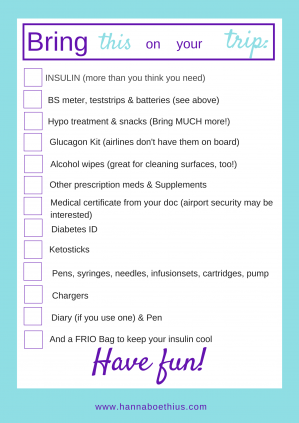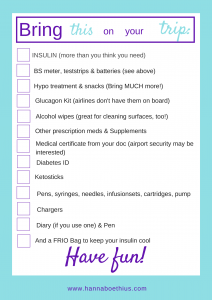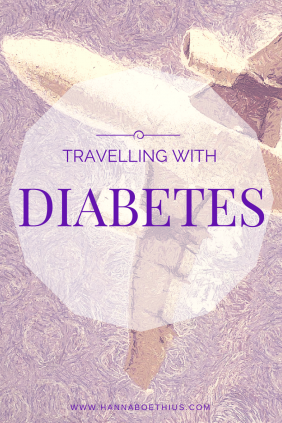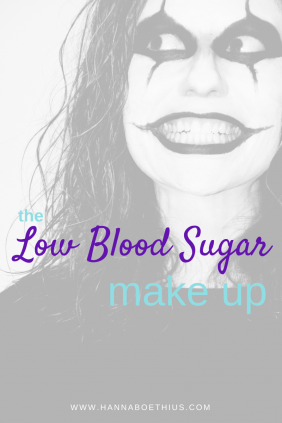Blog
Travel Checklist for Diabetes
Maybe you’re planning a trip soon and would love a travel checklist for diabetes?
(I made you a travel checklist for diabetes below, make sure to check it out!)
What is necessary to bring along on a long trip with diabetes?
Sometimes I feel like diabetes just has it’s own luggage to bring along, physically as well as emotionally.
The emotional luggage we’ll have to discuss another time, because this time I want to talk about the physical luggage Diabetes brings along. Especially when traveling.
As if packing for a trip isn’t stressful enough (“what shoes should I bring?”, “does this dress go with that jacket?”, “what make up should I bring?” and “WILL IT ALL FIT IN MY BAG?!” – you get the point…), as an added bonus, you also have to haul around on all the stuff that you need for diabetes to keep in line.
I always bring all my supplies in my carry on bag when I fly. That way it’s harder to lose it, and the insulin stays at the right temperature throughout my trip.
The size of said carry-on bag has changed, though, in favour of trying to save my shoulder from falling off from carrying all the heavy stuff. Now I bring along a small, cabin sized wheelie bag where I have all my supplies, from insulin, to pumps, to test strips, to hypo treatment.
I also deposit a few things in my traveling buddy’s, usually my husband’s, bag. At least that way, if I lose my carry on, I’m not completely stranded in terms of diabetes. He has an extra blood sugar meter and test strips, and insulin with emergency-syringes. And glucose tabs. One can never have enough of those.
While I make sure to bring along most things on my travel checklist for diabetes, I don’t always bring everything.
Like ketone sticks, for example. I don’t usually bring those, unless I’m traveling somewhere really remote with no pharmacy within the next hour or so of driving. I figure that I can buy them pretty much anywhere I go.
On the other hand, insulin and BG test strips can get really darn expensive, not to mention inaccessible without a prescription, unless you prepare properly and take enough with you for your whole trip. “Enough” here means way too much, by the way. You never know what might happen, so it’s better to be prepared for most things that may happen.
Food
And, pretty please, get organized and bring your own snacks. Food on the road is generally beyond terrible, and like that you know you can at least eat something. I bring things like nuts and dried meat and other cutleryless foods on the plane, whilst in a car or on the train you can get a little more creative. This time around I’m going to make low carb pancakes and wrap them up in foil to bring along on my long flight, as I know from experience that food on flights is never good.
Another note regarding food, please don’t get fooled by the “need” to snack, which is most commonly masking the fact that you’re bored out of your brain.
Water
Traveling by plane is like sitting in the middle of the desert, although maybe not quite as warm. It’s dehydrating like nobody’s business! Being hydrated can really be one of the keys to better diabetes management, so please do us both a favor and DRINK A LOT OF WATER! (and skip the booze up in the air, but that one is evident, right?)
Security
Getting through airport security can be a lot easier than it’s made up to be. This is of course assuming that you don’t meet an a-hole security agent.
In my 30 years of living with diabetes, having traveled to many different parts of the world (although I have MUCH left to see and visit!), I’ve been stopped exactly twice at security. Once for my test stripes (what, you didn’t mind the syringe full of potentially very deadly stuff in my bag? Ok, then.) And once because my pump set the alarm off. In both cases it was easy to explain, and I didn’t even have to show my medical certificate. Security agents see so many diabetes supplies on a daily basis; they’re barely phased by them anymore. At least within Europe.
Now, I’ve heard that US TSA agents can be a little trickier to handle. For example, they have no problem jeopardizing your super expensive medical equipment and tell you to go through the full body scanner wearing your insulin pump, for example. I would insist on the pat down, not risking any breakages or malfunctions. This of course means that it might take a little longer for you to get through, but it’s worth it, and as long as you know about it, you can plan for it.
The bottom line is, as long as you’re nice and cooperative (enough) to them, they’ll usually treat you with the same respect.
Anyway, let’s check out the goodie in this blog post, my Travel Checklist for Diabetes.
These are the absolute essentials that you need to bring with you (or at least ocnsider bringing with you). If you think “I’ve never needed that before”, you should probably take it along anyway, as traveling can make your body do some funky stuff.
Travel checklist
- Enough insulin to cover the days you’re gone (this should be a no brainer!) Make sure you bring both basal and bolus insulin, even if you’re using an insulin pump. You just never know…
- Blood glucose meter & enough test strips, extra batteries (it might even be good to bring an extra BG meter.)
- CGM sensors
- Keto sticks (As I said, I don’t always bring them)
- Glucose tabs (or whatever you use to treat a hypo) (Bring too much of this, you never know what your body think of your new location.)
- Snacks. (See above)
- Glucagon Kit (most airlines don’t have these on board their planes. Better be safe than sorry!)
- Alcohol wipes (these are great, not just for setting infusion sets and cleaning fingers, but also for wiping surfaces like tables, handles or cutlery that seems unclean.)
- Other prescription medication and supplements you may be taking (easy one to forget, trust me. I’ve done it before.)
- If you’re going somewhere really warm (lucky you!), bring something like the FRIO bag to keep your insulin in. (http://www.frioinsulincoolingcase.com)
- Medical Certificate (This can save you at security checks!)
- Diabetes ID (If you’re found unconscious somewhere, I’m sure you’d prefer that the EMTs knows what you’ve got.)
- If you’re going somewhere remote, bring a glucagon set. (Again, you never know.)
- Your BG diary, if you use one. (Otherwise there’s some great apps for that, for example www.glucosebuddy.com or www.mysugr.com)
- Address and telephone number of your doctor’s office.
If you are on injections, also bring:
- Insulin pens, plus back ups
- Pen needles
If you’re on a pump, also bring:
- Your pump, as well as possibly getting a back-up pump. (This can be ordered from your pump manufacturer.)
- Batteries/Power adapter
- Cartridges (if your pump uses those)
- Infusion sets, or just enough of patch pumps
- Syringes/pen for emergencies
- Basal insulin for emergencies
If you’re planning a pumpcation (vacation without your pump):
- Your action plan, that you’ve talked to your med-team about
- Pens and needles
- Basal and bolus insulin
It’s better to take too much than too little!
I’ve made a pretty print out of this list that you can print out and tick off the boxes as you put the items into your bag.
Click here to download the list: travel checklist diabetes
What are your best traveling tips? What can’t you travel without? Let me know in the comments!
Travelling with Diabetes
Travelling with diabetes requires quite some extra effort.
And planning. And “in case of” and “in case shit happens” preparation.
Especially if you’re planning to travel far, across the oceans and time zones.
Travelling with diabetes isn’t impossible by any means. I’d say it’s actually the opposite. You just have to know and prepare properly for it.
As I’m leaving on a longer-than-usual trip soon, and as it is my first trip that far with the pump (I really don’t travel enough, clearly!), I went to see my lovely diabetes nurse for some tips and tricks and general good advice.
(Where am I going, you’re wondering?! You’ll find out soon, if you follow me here!)
It turns out A LOT has happened in terms of handling diabetes on the long-go, at least if you’re wearing a pump.
Last time I crossed continents, I was still on Lantus and had very little idea of how to handle it all, with the time zones, different rhythms and change in exercise level. Let’s just say I didn’t handle it optimally well. Partially because I didn’t know how to, partially because I frankly didn’t care about it then as much as I do today.
As a result, my blood sugar levels were all over the place, I was exhausted, not only because of the time zone change, but also because of the rapid blood sugar changes. Add on to that arriving in a bustling city where I had never been before (NYC that time) and wanting to explore it ALL in the few days we had there…
Let’s just say that that equation didn’t really add up to work in my favor.
Which is why, this time around, I’m taking much more thorough precautions before setting off.
Hence, I scheduled an appointment with my diabetes nurse.
First of all, I wish everyone had the opportunity to work with a diabetes nurse as awesome as mine is. She has a safely secured spot in my Dream Health Care Team, that’s for sure.
Secondly, she had a really nifty trick up her sleeve for me to use while in transit.
She suggested that I’d set up another basal program on my insulin pump, with a constant basal rate for the first (few) days. Basically as long as it takes me to get over the biggest jetlag factor.
I have pretty low basal rates throughout a 24 hour time period, between 0.4-0.55 units per hour, giving me a total of 11,3 units per 24 hours. Her suggestion was to set up a basal profile with a constant 0.45 units per hour for the first 24 hours, to give my body a chance to acclimatise quicker, and then turn on my normal basal profile (and change the time on my pump) when I either realize weird spikes in blood sugar, or I feel like I’ve caught the worst of the jet lag wave. (Lowering my basal while travelling seems to generally be a fantastic idea…)
This was completely new to me. And, granted, I haven’t tried it out yet, so I can’t tell you how well it works (or not). But it seems a lot easier than the old ways of changing basal injection times and dosages along as your jet lag diminishes…
Perhaps is travelling with diabetes just that much easier with an insulin pump?
This wasn’t of course the only advice she had for me. Along with the “usual” tips of bringing (much) more supplies than you need, a doctors note for security checks, an extra blood sugar meter & test strips for it, staying hydrated, getting sleep during night time, paying close attention to blood sugar, bring a glucagon kit and snacks, snacks, snacks, she also showed me the “device” (aka chart on a piece of paper) that she uses to calculate a possible return to Lantus dose.
This is excellent information to have if I ever want to go on a pump-cation (a break from my insulin pump), or, if by any chance against all odds, my whole pump system breaks and I need to take Lantus until a replacement arrives. Because I take on average a total of 18 units of insulin per day, the chart showed that my Lantus dose should be around 20 units per 24 hours. I have no idea about the conversion calculation that is used here, so if you do, please leave a comment below!
I feel really relieved and happy that I’m doing all this preparation work for my trip. Now it’s just to keep fingers crossed that the actual trip itself goes as smoothly as the preparations have done so far.
How do you travel with diabetes? What tricks and tips do you use? Please share them in the comment below!
Too Much Fat?
Is there such a thing as eating too much fat?
It’s been widely proven by now that eating fat isn’t bad for you.
But just how much fat is too much fat? And especially on a low(er) carbohydrate eating plan?
Let’s go back a couple of steps first…
When you eat something, your body starts digesting it in your mouth with enzymes. Starting with the sugars, as the food moves along the digestive path, other carbohydrates, proteins (amino acids) and fats are all digested and broken up into little, usable parts for the body. The body uses these small parts to rebuild itself, give you energy and make sure every single cell works just like it should, from your hair follicles to your intestine wall. If you’re eating the right things, that is…
So what should you eat, whether or not you have diabetes?
Essentially, it’s pretty simple: proteins, fats and carbohydrates. But whether or not you’re eating too much fat majorly depends on what else you’re eating.
But I guess you were looking for a more detailed description?
Carbohydrates
The issue with carbs is that it’s really a double-edged sword.
On the one hand, they provide you with lots of energy that your cells know exactly how to use.
On the other hand, it’s way too easy to over-load on said energy, which your body will only turn into saturated fat in your fat cells.
And then we add in where the carbs come from.
Phew, no wonder everyone seems confused about this and keep arguing about what’s right and what’s not!
What’s true in terms of how the body works is that every type of carbohydrate you eat is eventually split up into a simple form of sugar (aka glucose). This means that all that bread, pasta, cereal, potatoes, rice, fruit, dessert, candy, and sodas (to mention a few) you eat and drink eventually end up as glucose (sugar) in your body.
While sugar is indeed energy, and your body needs some to survive, it is actually quite toxic in large amounts. The cells in your body has an amazing capability of burning (and also storing) this energy, but for that the sugar needs the key to get in. The key is called insulin. And what don’t we produce (enough of) if we have diabetes? Yep, INSULIN.
In super simplified terms, insulin stores sugar as fat in your fat cells. And if you’re insulin resistant (Type 2 Diabetes), or not producing insulin (Type 1 DIabetes), it prevents sugar AND protein (amino acids) from entering muscle cells, so you can’t build or maintain your muscle mass. Joys of diabetes, hey?!
I think we can all agree that knowing this makes it a good idea to make sure we don’t get too many carbohydrates. And I haven’t even mentioned high blood sugar yet!
How many carbs you can eat is quite individual, but if you have problems with your blood sugar (diabetes of any kind or type) or insulin resistance/hyperinsulinemia, your carb count should stay low. How low is up to you, but I’m sure you’ve figured out that the mentality of just “eating whatever you want and cover for it with insulin” doesn’t exactly work flawlessly for many of us…
Which carbs are good for you and which are not?
It comes down to processed versus natural carbs, really.
All of the ones I mentioned before (bread, pasta, cereal, potatoes, rice, fruit, dessert, candy, sodas…), I wish would just disappear from our food supply. They’re all highly processed, made in a plant with ingredients that have little or no resemblance to the natural, nutrient dense foods we used to eat. Making them easy to overdose on.
What you’re left with is basically vegetables. Organic, if you can. Some berries. And sometimes fruit (but they have quite a lot of carbs, so watch out if you have diabetes!).
But, if you eat less of the carby stuff, what is left?!
Proteins
Proteins are really important for your body.
They are the building blocks that your body uses to repair itself.
How much protein is good to eat, then?
A great rule of thumb is to calculate about 0.8-1.0 grams of protein per kilogram of body weight a day. If you’re looking to lose weight, this should be 0.8-1 g per kilogram of your goal weight.
Let’s put this into practice!
So, if a person weighs 60 kg, they should be eating somewhere in the range of 48-60 grams of protein a day. That does NOT mean 48-60 grams of meat, for example, as meat only has 20% protein. This means this awesome person should be eating between 240 and 300 grams of meat a day (if meat is the only protein source, of course).
On the other hand, if a person weighs 100 kg and wants to weigh 90 kg, they should be eating around 72-90 grams of protein a day, meaning 360-450 grams of meat a day.
Keep in mind that there are other protein sources as well, and I’m only using meat as an easy, accessible example.
Eating more than this runs the chance of your liver (mainly) turning the excess protein into glucose through gluconeogenesis anyway, which you really don’t want, especially if you have diabetes.
To summarize it so far, less carbs and moderate protein. Are you with me?!
Fats
Lastly, but most gloriously, we have fats.
The fear of fat is really outdated by now, being started by a scientist that turned data into what he wanted it to show (Ancel Keys).
Today we luckily and happily know a lot better! Now we know that eating fat is necessary, there are essential fatty acids we need to get in order for our bodies to work properly.
Generally, there isn’t really an upper limit for fat intake. You just eat the rest of your food in the form of fat when you’ve fulfilled the carb and protein ratios.
Again, there’s a difference on fats and fats, just like i mentioned for the carbohydrates.
The key really lies in starting with the cleanest saturated fats (butter, coconut oil, dairy (if you can handle it), meat, cocoa butter) you can. Everything gets better with butter! Secondly, choose your monounsaturated fats (nuts, olives and avocados). Lastly, choose your healthy polyunsaturated fats like certain nuts, seeds, avocado oil and fish oils (omega 3).
It’s not more complicated than that, really.
Of course, if you’re eating lots of fat, keeping your carbs and proteins where they should be, and STILL gaining weight, you could be eating too much of it for your individual needs.
Another way of telling that you’re eating way too much fat is by looking at what comes out, i.e. your poop. What you put in is what you get out! If your poop sticks to the toilet (you have to use the brush a lot), it’s a sign your body can’t use all the fat you’re eating.
To sum these shenenigans up: figure out your carb count, then your proteins, fill the rest up with fats. Simple, right?
But whether or not you’re eating too much fat majorly depends on what else you’re eating.
Do you eat enough fat?
The Low Blood Sugar Make up
Diabetes gets in the way of life sometimes.
And the other way around, too. But that’s the topic of another story.
Being such a big part of our lives, it would be weird if it didn’t mix in and mash up your plans sometimes.
Sometimes we’re talking about interrupted sleep, another time it’s an unplanned meal on the menu. And sometimes it’s about being so tired, simple chores can be compared to climbing Mount Everest. At least. Not to mention the guesstimation game we play with the pancreas on our hip, in a pen or syringe. Up? Down? A little up and then down? The other way around? Or even *gasp* stable and level? (Watching your blood sugar do a salsa dance on a cgm is sometimes entertaining, as long as you don’t put too much personal attachment to the numbers)
You can almost never tell with 100% accuracy where your blood sugar will end up after a meal, some insulin or just by plain old living.
And sometimes you can’t let the stubbornness of diabetes get in the way, either.
Like the other morning, when I had to get to an appointment I had.
I woke up at 4.4 mmol/l (79 mg/dl), which I was happy about. My cgm curve looked smooth from the night and I was even more happy about that.
I jumped in the shower, washed my hair, moisturized and brushed my teeth. I was feeling a little sleep-groggy, but nothing else.
I went to put on my clothes, got dressed and noticed an odd, fuzzy thought popping up in my head that usually stems from the low-blood-sugar-drawer in my brain.
Nevermind that right now, I had other things to do, like taking my morning medicine (thankfully not insulin) and supplements.
When I got back downstairs from the kitchen, my next task was to do my make up. But I decided to check my cgm first, which showed 4.1 mmol/l (73 mg/dl).
Ok, I thought, that’s not bad, although I’m dropping. More of the odd, fuzzy thoughts popped up, and I decided to check my blood sugar on my blood sugar meter, if only to ensure myself that I wasn’t low.
3.4 mmol/l (60 mg/dl) “treat your low BG!”, my d-companion Doris (OmniPod) was telling me.
“Ahh, eff-word”, I said out loud. “I don’t have time for this!”
I usually don’t treat lows until below 3.5 mmol/l, as I find they usually recover fine from there with just the help of lowering the basal on my pump. But as I was leaving, and it was 0.1 mmol/l lower than my usual threshold, I decided to pop a glucose tablet and shut of the basal on my pump for 30 mins.
Knowing I’d be completely OK within 15 minutes, but had to leave the house in 20, I had little choice but to continue with my morning routine and my make up, which is a fairly effortless task.
If you’ve never experienced a low blood sugar before, let me tell you that it can be quite “interesting”. It feels a bit like being tipsy, without having had anything fun to drink. Or like being in a very fast, accelerating car while standing on the ground. It can be dizzy, vertigo, confused and temporary vision problems all in a big merry go round that doesn’t want to stop right now. (It can also feel a gazillion times worse than that, but thankfully that wasn’t the case this time.)
Having to think twice if you’re *actually* using foundation and not the bright pink blusher heavily all over your face is a challenge I’m usually blessed from. I usually know where things go in terms of make up…
Or double-checking that the eyebrow pencil is still brown and you didn’t accidentally reach for the turquoise eyeliner to fill in your eyebrows instead. Or concentrating so hard on getting mascara ON my eyelashes and not only underneath my eye. Not to mention actually getting that blusher semi-equally distributed. Or checking that the foundation isn’t blotchy anywhere.
This can, but probably shouldn’t, be compared to doing your makeup after a good after work drinking session with your colleagues. In short, no bueno.
Throughout this particular mornings routine work, I kept thinking if I actually managed that well with everything, or if, once I was back on track again, would find myself looking like some Cubist rendition of myself. Or like a clown. Or like Gene Simmons from Kiss.
All I could imagine seeing once the low blood sugar fog had lifted was some weird version of myself, as it would have been painted by Pablo Picasso himself. Or something equally scary.
This time I was lucky, though.
When my blood sugar was back in normal range again, I saw that I looked more or less like myself, if only ever so slightly more tired.
What do you do when your blood sugar drops low, do you keep going or stop and wait? What does your decision depend on?
Diabetes Expert
Diabetes Expert – that’s a bold statement!
Being an expert, you have to be perfect, don’t you?
You need to be able to juggle anything that is thrown at you, know every single little detail about your topic and preferably have 67 Masters, PhD’s and other qualifications to be one.
Right?!
I used to think so. I really did. “Experts” in my life used to be my doctor and endocrinologist, for example. And these people know a lot, they definitely do. But they usually have zero training in nutrition, for example.
And they may not know or understand everything about YOU and YOUR individual case. You’re always going to be your own best doctor, because you know YOUR body, your situation and your case the best.
So, who am I to call myself a Diabetes Expert?
It’s true, I don’t know everything about you, your life and your case. Yet. But I am willing to listen, learn and help you on your road to become a healthier you.
It’s really my passion in life, to get to help you through what I’ve already been though. To share all the tools, tricks and food that I’ve found has helped me and many others.
But what happened to GrainBrain? I’m sure you’re curious!
GrainBrain has been a fantastic stepping stone on my journey of becoming healthier, happier and more experienced. And it has served me very well when I was only about eating healthier (i.e. grain free).
Now that I’m fully focusing on helping people with diabetes to become healthier, lower their A1c’s and feel more confident, I feel that the name GrainBrain has run it’s course in my business.
I don’t want to hide behind a brand anymore, I want to show even more of myself, my journey and how I can help you on yours. Become even more authentic, if you want.
Which is why I’ve decided to change the name of my business, refurbish the website and get a fresh breeze in here! So please help me welcome Hanna Diabetes Expert!
In light of this, I looked up how a few people define what an expert is. And their answers made me smile.
Warning – there’s some self-assessment coming up! :-)
“What qualifies anyone to be an expert? I view an expert as someone who has considerable intellectual knowledge and real world experience in a particular field, area of study, process, or activity. They possess knowledge and experience in greater measure than a majority of others in their field. And they can express their expertise in order to help others understand and implement any appropriate ideas and actions based on that information. (…) Today, I would venture to say experience builds expertise faster and stronger than education. For education not applied is merely knowledge locked in the brain and not tested in the real world.”
Well, if 30 years of trials, errors, successes and blood, sweat and tears aren’t experience enough, I’m not sure what is?
I thought this was a really interesting point of view. Another article I found, listed 5 quite similar characteristics of being an expert as states above:
“Knowledge: Clearly being an expert requires an immense working knowledge of your subject. Part of this is memorized information, and part of it is knowing where to find information you haven’t memorized.”
This is one of my favorite parts of doing what I do – I learn new things every day. Whether it’s about myself, a client, or diabetes in general, I make sure there’s an ongoing addition to my knowledge.
“Experience: In addition to knowledge, an expert needs to have significant experience working with that knowledge. S/he needs to be able to apply it in creative ways, to be able to solve problems that have no pre-existing solutions they can look up — and to identify problems that nobody else has noticed yet.”
Having a coaching background that has taught me a trick or two throughout the years is certainly beneficial. Experience and knowledge go hand in hand. And, the whole reason you work with someone, be it a coach, mentor or expert of some sort, is to get another perspective on your situation. It’s so easy to get stuck in your own bubble and lose view of the Big Picture. Working with someone on the “outside” of that bubble can really help you regain your aerial view.
“Communication Ability: Expertise without the ability to communicate it is practically pointless. Being the only person in the world who can solve a problem, time after time after time, doesn’t make you an expert, it makes you a slave to the problem. It might make you a living, but it’s not going to give you much time to develop your expertise — meaning sooner or later, someone with knowledge and communication ability is going to figure out your secret (or worse, a better approach), teach it to the world, and leave you to the dustbin of history (with all the UNIX greybeards who are the only ones who can maintain the giant mainframes that nobody uses anymore).”
Yes, communication is definitely key. In any relationship. But there’s also a huge difference between talking to someone and talking at someone. The latter is usually a waste of everyone’s time. And you can only communicate your solution to someone who is ready to hear it.
“Connectedness: Expertise is, ultimately, social; experts are embedded in a web of other experts who exchange new ideas and approaches to problems, and they are embedded in a wider social web that connects them to people who need their expertise.“
I aim to help as many people with diabetes as possible. To get new input and not get stuck in old ways, I make sure to stay connected to different other experts within fields of interest to my clients.
“Curiosity: Experts are curious about their fields and recognize the limitations of their own understanding of it. They are constantly seeking new answers, new approaches, and new ways of extending their field.”
One fatal mistake would be to get stuck in my thoughts, my ways and in what has worked for other clients. Every client is a new, exciting opportunity to help someone with a problem (or many).
I want you to know something though…
Being and calling myself a Diabetes Expert definitely doesn’t mean that I have perfect values all the time, endless amounts of energy, smooth cgm curves and my A1c keeps effortlessly where it should be. I have catastrophical days, too. Because there is no such thing as a perfect diabetic.
Diabetes is a lot of hard work. Sometimes grueling hard work. But it’s also about perspective and wanting to find a solution. Finding YOUR solution, how you can cope with it and how you can turn it into the very best you can.
What are you an expert in? How do you share this with the world?






